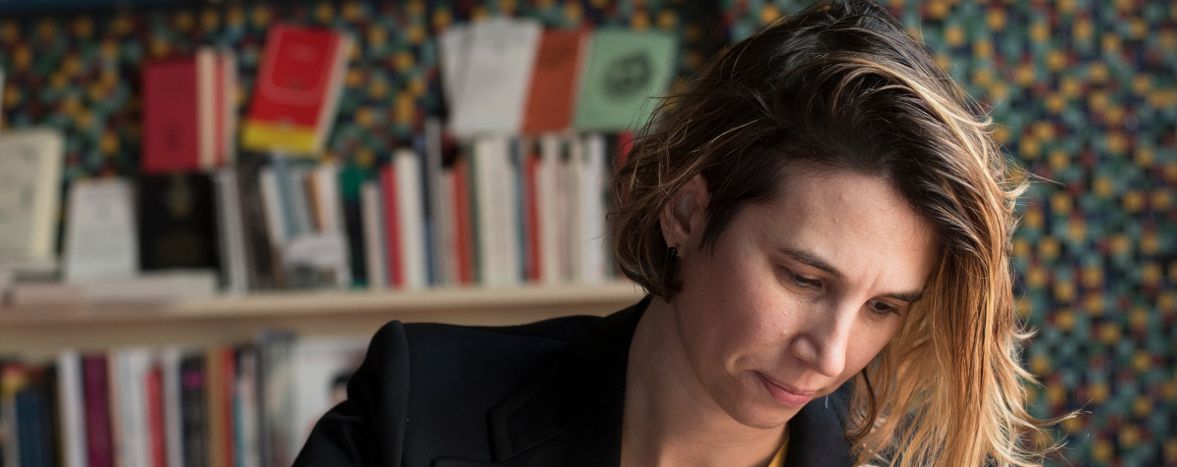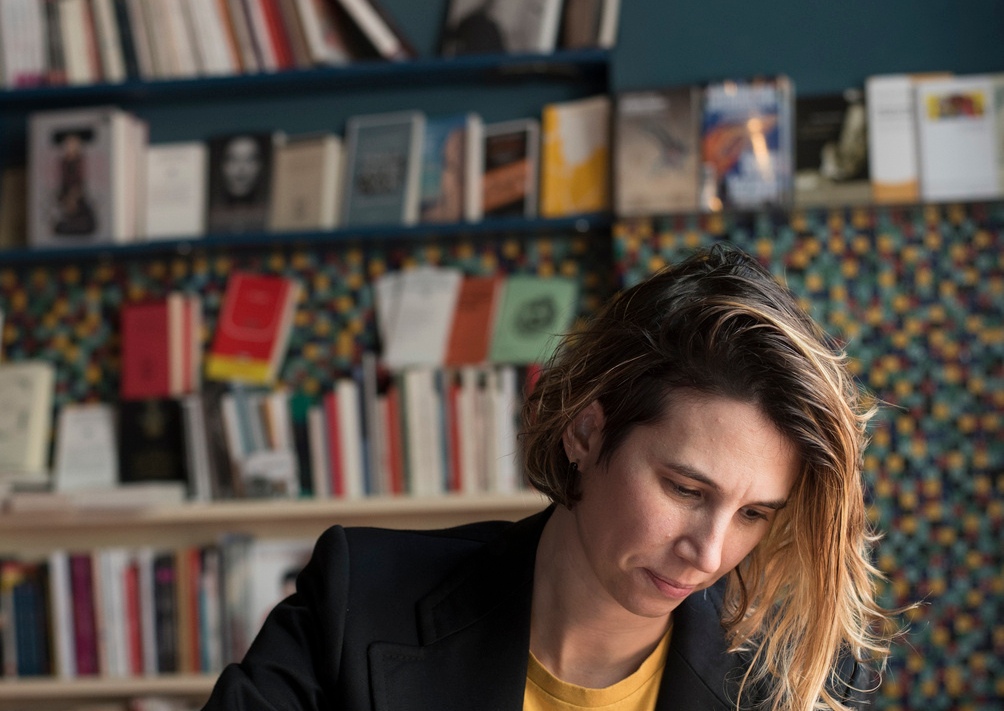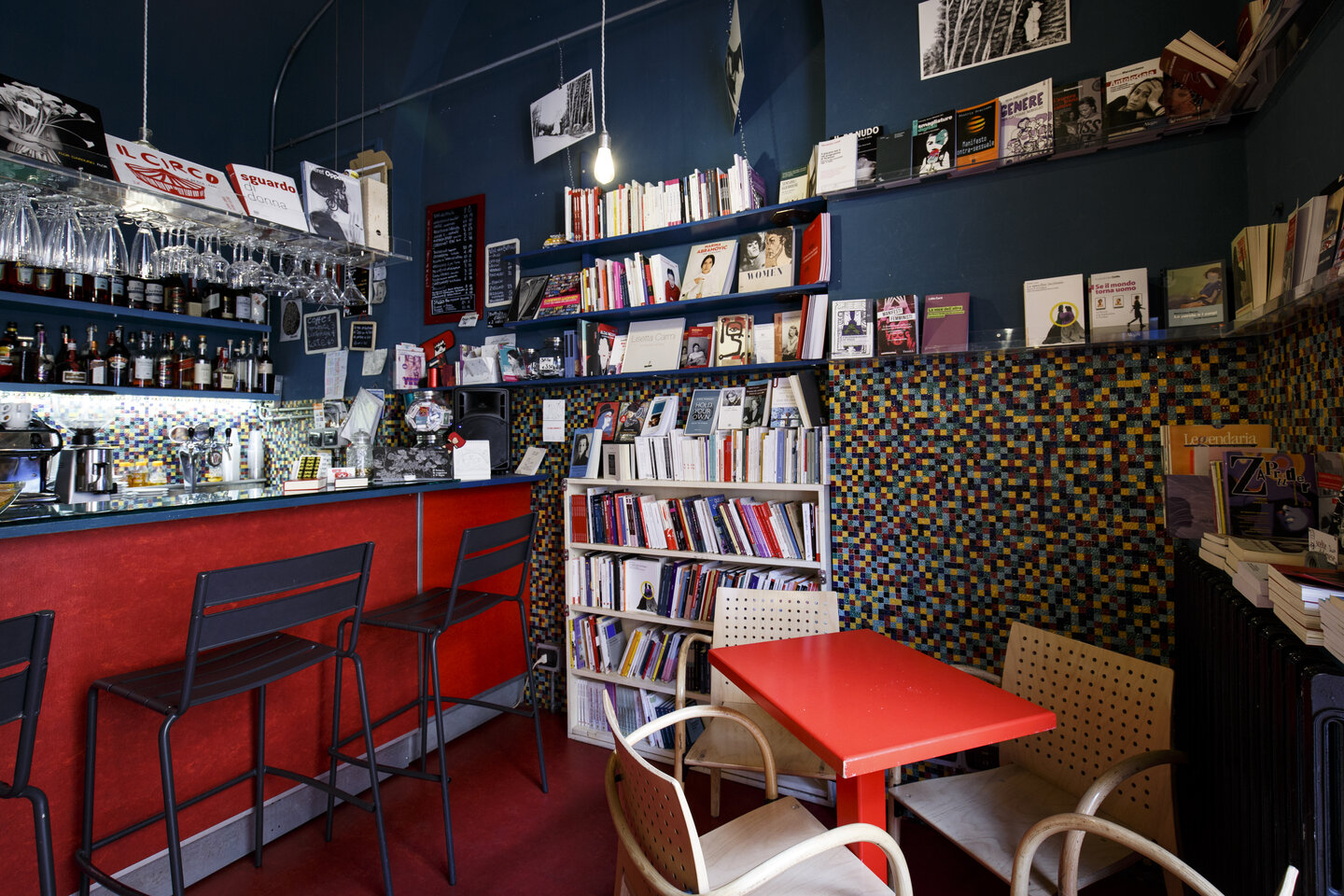
Rome: the past and future of Italy's feminist spaces
Published on
Translation by:
Fabiola BettinazziSince the 1970s, Rome has been an important meeting point for Italian feminists. Today, Tuba, a popular bookshop, is leading the effort to bring the city's long tradition of women-led cultural spaces into the 21st Century.
Tuba is a women's bookshop, bar and bazaar, nestled among the coffee tables that populate the pedestrian area of Rome's Pigneto neighbourhood. It's clear from the red floor, wide balcony, and window filled with items concerning female sexuality that this is a feminist space, one in which every detail contributes in some way to the struggle for women's emancipation. On the outer walls, amidst the colourful chairs, are posters advertising the Bande de Femmes a comics and illustration festival which was held last December. Inside, they only sell books by female authors.
Viola Lo Moro is one of co-managers of the store. She also curates the cultural programme and is the author of a collection of poems Cuore Allegro which was published in October 2020: "Tuba is a space for women," she remarks, "it's a particular place with a double significance that is both political and business-related. It has the sociality of a bar, but it's also dedicated to female sexual pleasure and health, as well as offering books and literature where women themselves are always at the core."
A new kind of community
Back in 2007, when Tuba first came into being, the two founding partners, Barbara Piccolo and Barbara Leda Kenny, were based in a smaller premises around the corner. According to Viola "[Pigneto] was a completely different neighbourhood at that time, but somehow it already had a certain buzz of Roman feminism and lesbianism. To be honest [the old shop] was just a few square metres wide; a quite 'homey' place with a red sofa in the middle. Obviously, everything transformed quickly and it became a gathering place for many different feminisms."
Since the new store opened, the user-base has broadened to such a degree that today it is managed by an association of ten women. Tuba is a rich cultural space, open from morning breakfasts through to happy hours, offering book presentations and late night meetings. People visit all day, stopping for lunches or to work on their laptops. Over the past few years, the space has increased the number of debates and events it hosts. These now include two annual neighbourhood festivals: Bande de Femmes, the aforementioned comic book event, and Inquiete, a festival for female authors. Viola is responsible for organising these activities, including scheduling, PR, relations with writers and speakers, social media and photography.

Inquiete is based on a network which extends far beyond Tuba itself. Last year the event was held online, though usually it fills the streets of Pigneto. "The aim of Inquiete was to create a festival in the neighbourhood that could also have a metropolitan and national dimension, bringing together female authors, journalists and intellectuals," says Viola. "It's a festival where female writing really is at the very centre. This isn't just a theme, it's about valuing this work in its own right."
Bande de Femmes, meanwhile, uses the medium of comic book drawing and illustration to explore narratives related to bodies, sexuality and LGBTQI+ life. Last year, for the seventh edition, the event had to take place online, but it still had a jam-packed programme spread over four days which included art labs, a virtual exhibition and a line-up of international participants.
On a more everyday level Tuba serves as a gathering place for the residents of Pigneto. "Barbara and Sara, for example, are responsible for the book orders and the relations with publishers, but then 'everybody does everything': we work at the bar, we recommend books, we take care of the thousands of things there are to do. We try and read as much as possible and share opinions about books. We all have different literary tastes, so each of us keeps tabs on a certain catalogue and then reports to Barbara, who monitors the orders. Personally, I'm fond of poetry, family novels and adventure novels," says Viola.

Tuba is not only focused on promoting reading and literature, it's also a space for foregrounding the body, pleasure and socialising. On the one hand, the store was inspired by 'Sexy Shock', a shop which opened in the Italian city of Bologna in 2001 and which was focused on female sexuality and sex toys. On the other, its founders were inspired by the long international history of women's bookshops, and particularly those in Argentina. But there's no need to fly halfway around the world. The adventure really began with the closing of ‘Al tempo ritrovato’ ('Time Regained'), a feminist bookshop that was once a landmark in via dei Fienaroli, in Rome's Trastevere neighbourhood. To understand the implications of this transition, however, and the impact on the present, we have to take a detour back in time to the activist climate of the 1970s.
Time regained once again
"The Roman feminist movement has been very rich, diverse and heterogenous," says Paola Stelliferi, a historian and author of a recent book on the topic. "Between 1969 and 1970 the first 'separatist' groups began to take shape (associations made up exclusively of women who did not accept the involvement of men.) After the 1974 Italian divorce referendum in particular there was an enormous growth, something so explosive that we can talk about a mass movement which brought together feminists, Marxist-feminists, and female artists. Associations began to proliferate focusing on specific areas such as self-help and female health, and there were autonomous clinics, cultural associations, editorial groups and theatre associations too."
During that period, feminist spaces were venues for art and culture which were connected to other movements and to the rest of society. A good example is 'La Maddalena', a cultural association which was the first women's bookshop in the city and which, in the 70s and 80s, also served as a theatre and the newsroom for a magazine called EFFE. In short, this was a complex ecology that was confined to the city centre at first, but which then spread like wildfire to working-class neighbourhoods, and especially to areas where the extra-parliamentary left, the unions, and the PCI (the Italian Communist Party) had influence. "The Magliana, a suburb in the south-west of Rome for example, was a political laboratory for housing activists and for the tenants' rights movement. And it was also a hub for vibrant feminist activism," says Stelliferi.
It was into this panorama, in 1977, that Maria Luisa Moretti, an activist in Magliana, decided to open ‘Al tempo ritrovato’; first in the city centre, in Piazza Farnese, and then in Trastevere, across the river. This was a significant moment of transition for the history of Italian feminism. Women had already experienced a decade of mass demonstrations and fights in the squares. Thousands had taken to the streets to claim their rights, had joined and started unions and come to experience a new kind of consciousness. As the 80 began, however, these movements entered a moment of crisis.
According to Stelliferi, ‘Al tempo ritrovato’ represents the "twilight of the atmosphere of the late 70s, and the declining phase of that period of activism." Maria Luisa Moretti herself left the union she belonged to, and which was already in the process of splitting, in order to open the bookstore which then became a shop, a business, and, ultimately, a place for feminist cultural gatherings." In Rome and elsewhere at the end of the decade many other activist organisations broke up. But this was not the end. "[These groups] transformed into entrepreneurial activities, into women's bookshops and magazines, into the arenas of feminist studies and women's history. The bookshops confirm that women's self-organisation did not stop at the end of that decade of struggle; on the contrary, people looked to the future to find new languages and new forms of activity."
Even based on this brief panorama we can see that women's bookshops were a distinctive feature of the feminist movements in the 70s. They were born from the need for spaces where women's voices, often unheard in a male dominated world, could have a dignified place. "The aim was to initiate a process of liberation from patriarchal ideologies and belief systems; to give space to women's creativity and to allow [women] to live and experience without being afraid of going beyond predefined boundaries." Since then, feminist bookshops have spread all across Italy and have become places for discussion, for thinking about politics, and for producing ideas and knowledge in publications that link the initiatives taking place in different cities together.
What's left besides Tuba?
In other cities, such as Milan, historical feminist bookshops have outlived the end of the last century. In Rome, however, this particular era seemed to have come to an end when ‘Al tempo ritrovato’ closed its doors in 2004. With the notable exception of Tuba that is. But what remains of Roman feminism today beyond that single store? "Today the Casa Internazionale delle donne ('International Women's Home') in via della Lungara, in the Trastevere neighbourhood, is still active, and it's a centre of activism as well as the headquarters for feminist associations and the movements' archive," says Stelliferi. That said, on a closer inspection, very few of the historical spaces of Roman feminism have survived. "The headquarters of the first Casa delle donne, Palazzo Nardini in via del Governo Vecchio, is no longer accessible." That specific venue, which was occupied by the Women's Liberation movement in October 1976, was home to many unions, newspapers and radio offices, and also to the first centre against violence. Today, peeking through the cracks of the huge door, you can only see the courtyard of a Renaissance palace which has been abandoned for decades.
"There's not much left of that past to give a new meaning to public spaces. On the wall in via dei Sabelli 100, though, there is a portrait of Simonetta Tosi, a biologist who was a pillar of feminism. Tosi dedicated herself to women's health and medicine and, in 1973, she founded the first self-managed free clinic in the city. The headquarters was in the basement of a palazzo in the heart of San Lorenzo, a working-class neighbourhood with a strong political identity where other activist or politico-cultural groups used to be located."
This is no coincidence. Stelliferi underlines that, in Rome as anywhere else, "feminism is part of the social fabric, and not a separate phenomenon. The fights for the decriminalisation of abortion, and for self-determination with regard to sex and reproduction, for example, fall into the more general struggle for the right to healthcare and for the democratisation of medical knowledge. What's interesting in the Roman case is that it is a real kaleidoscope: you can see all the different experiences that then spread to the rest of the country."
Viola Lo Moro shares this interpretation: "Places are different because the people who live in those places are different. But Tuba is in constant dialogue with the other feminist spaces in the city, including the Casa internazionale delle donne but also Lucha y Siesta, a "shelter house" and a semi-autonomous centre opposing gender-based violence. In the absence of official action, women have been pushed to create their own networks and have banded together, particularly in the moments of struggle. Woman who are seeking help often come to Tuba. In such cases we've looked for support in the city's feminist network. Likewise, we have hosted meetings and presentations of other associations."
"Like many others, we've moved to the digital world due to the pandemic," says Lo Moro. "We've tried to do our best in re-appropriating technology like the 90s feminists, who we're very attached to, did: in the worlds of hacking, and of cyber-feminism. Starting to use technology in an affirmative way again, in a way that benefits us, has been a real victory in this dramatic year." Clearly, the feminist gaze underpins the very basis by which the bookshop has reacted to the pandemic just as it does the store's own literary anthology, which is now on sale. "Feminism is the substrate on which everything leans," concludes Viola, "it's a way of looking at the world, and when that way of looking changes the same is true of writing, relationships, and the way you move in the world."
Cover image: Carlotta Valente
Translated from La storia di Tuba e degli spazi del femminismo romano



